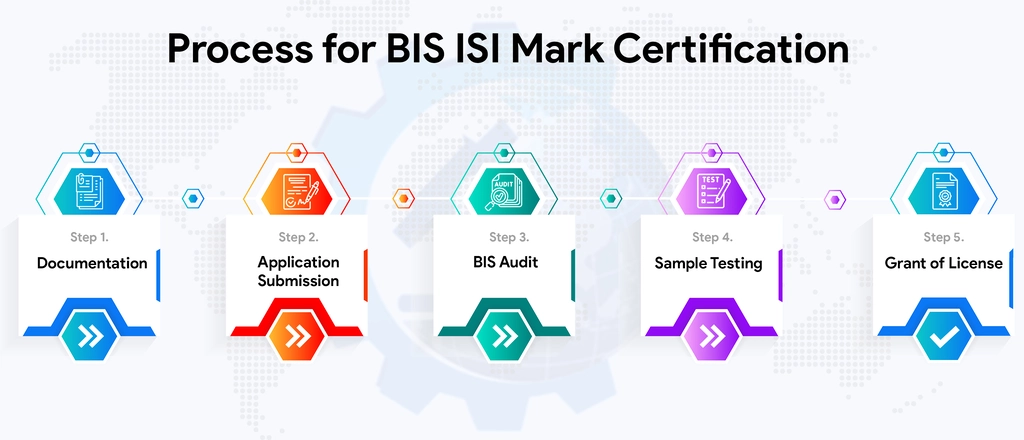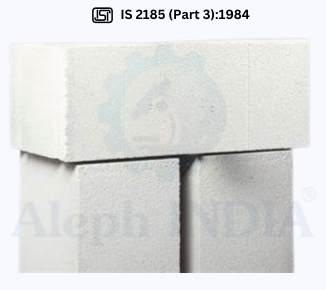BIS CERTIFICATION for Concrete Masonry Units - Autoclaved Cellular Aerated Concrete Blocks IS 2185 (Part 3)
Published Date: September 21, 2024
Introduction
Made to IS: 2185 (Part 3):1984 specifications, autoclaved cellular aerated concrete AAC blocks constitute a complete revolution in construction materials that are both environment-friendly and economical alternatives to conventional building blocks. This is a block that has been manufactured after proper steam curing and autoclaving at high temperatures. They assure good strength, with a specific density low enough to be used as a strong insulation material. BIS certification is required because these blocks have to ensure compliance with the most stringent parameters of quality and safety.
BIS certification is required because these blocks have to ensure compliance with the most stringent parameters of quality and safety. This not only opens up access to the Indian market, wherein sales of building materials are not permitted if they do not carry BIS certification but also confirms compliance with IS 2185 (Part 3):1984, thereby establishing credibility for the product and confidence in customers' minds. It further helps MSMEs gain entry into and expand in the market based on demonstrated quality of products. AAC blocks are becoming popular in India these days due to the many conveniences they offer against conventional materials. They offer thermal insulation better than conventional materials, optimum acoustic performance with better fire resistance. They are light and thus easy to manipulate and construct as well. These qualities make them popular for both new construction as well as renovation works.
End uses:
- Lightweight Design:AAC blocks reduce the load on structural elements, making them ideal for various construction applications.
- Thermal Insulation: Their excellent thermal properties enhance energy efficiency in residential, commercial, and industrial buildings.
- Versatile Applications:Commonly used for partition walls, load-bearing walls, and external cladding.
Overview of IS 2185 (Part 3):1984
IS 2185 (Part 3):1984 is an Indian Standard that specifies the requirements for Autoclaved Cellular Aerated Concrete (AAC) blocks used in construction. This standard outlines the dimensions, physical properties, and testing methods for AAC blocks, ensuring their suitability for various building applications. AAC blocks are lightweight, provide excellent thermal insulation, and are fire-resistant, making them a preferred choice in modern construction. The standard ensures that these blocks meet stringent quality and safety criteria, facilitating their use in both residential and commercial projects. Compliance with IS 2185 (Part 3):1984 is mandatory for market approval and certification in India.
Key Aspects of IS 2185 (Part 3):1984
- Material Specifications: Defines the composition, density, and physical characteristics of AAC blocks to ensure quality and durability.
- Performance Requirements: Establishes criteria for load-bearing capacity, thermal insulation, sound insulation, and moisture resistance.
- Safety Needs: Addresses fire resistance, structural stability, and environmental impact to ensure safe usage in construction.
- Testing and Compliance: Outlines methods for testing mechanical properties, dimensional accuracy, and durability to ensure compliance with standards.
Key highlights
| Product Name | Autoclaved Cellular Aerated Concrete (AAC) Blocks |
| Applicable Indian Standard | IS 2185 (Part 3):1984 |
| Applicable Certification Scheme | Product Certification Scheme (ISI Mark Scheme) Scheme 1 |
| Applicable Mark: | BIS Standard Mark (ISI Logo) |
| Compliance Requirement | Mandatory |
| Quality Control Order | Click here |
| Ministry | Ministry of Commerce and Industry |
| Scope as per Standard | This standard (Part 3) covers the requirements of autoclave cellular (aerated) Concrete blocks having density up to 1000 kg, m3. |
| Major Country of Import | China, Germany, UAE |
Applicable Tests for Concrete Masonry Units - Autoclaved Cellular Aerated Concrete Blocks IS 2185 (Part 3)
- Dimensions and tolerances
- Block density
- Drying Shrinkage
- Granulated blast furnace slag
- Water
- Additives or Admixtures

Note
For Detailed Information about the Procedure for BIS ISI Certification, Visit :
Timeline for BIS Certification
The approximate timeline to obtain BIS certification for Concrete Masonry Units: Autoclaved Cellular Aerated Concrete Blocks to use the ISI mark as per IS 2185 (Part 3):1984 is as follows:
- For Indian Manufacturers (Standard Timeframe – 30 days)
- For Foreign Manufacturers (Standard Timeframe – 180 days)
Benefits of BIS Certification
BIS certification offers several significant benefits:
| Benefit | Description |
|---|---|
| Access to the Indian Market | BIS certification facilitates entry into the extensive Indian market, boosting sales opportunities. |
| Compliance with Indian Standards | Ensures products meet specified quality and safety standards outlined in IS 2185 (Part 3):1984. |
| Enhanced Product Credibility | Certification acts as a mark of quality, distinguishing products in a competitive market. |
| Increased Customer Trust | Customers are more likely to purchase certified products, knowing they adhere to safety norms. |
| Benefits for MSMEs | BIS certification helps MSMEs gain market recognition and improve competitiveness and growth. |
Case Studies
A recent project in Mumbai consisted of a high-rise residential complex made out of AAC blocks. Relatively more significant comprehensive reductions in construction time and costs were achieved with this material besides increases in the energy efficiency and acoustic comfort of the building.
Conclusion
Such AAC blocks, being conformable to IS 2185 (Part 3):1984, have promised new solutions for modern building needs with enormous economic as well as environmental benefits. Providing BIS certification is an essential prerequisite for ensuring quality as well as market access; ALEPH INDIA supports the manufacturers in attaining this critical task. The smoothened processes undertaken while ascertaining that AAC blocks are conformable to stringent standards will increase customer confidence in their reliability and performance.
Aleph INDIA has been serving the industry as a single-window operator for all product regulatory compliance. We can assist importers or manufacturers in meeting all criteria for importing or selling a product in the Indian market.
Frequently Asked Questions
International Audits & Participation
Testimonials
BIS REGISTRATION FOR ELECTRONIC & IT PRODUCT
In the era of globalization, world trade is growing rapidly and henceforth, Manufacturing and Import/Export businesses are also growing drastically...View More
BIS CERTIFICATE FOR FOREIGN MANUFACTURER
The Economy of India-the fastest developing economy on the globe with the capabilities that help it matches up with the biggest international...View More
PRODUCT CERTIFICATION SCHEME (ISI MARK) FOR DOMESTIC MANUFACTURERS
Anything a person buys from food to cars, clothes to electronics, branded to unnamed products there is always a question that wanders in one’s...View More
WIRELESS PLANNING AND COORDINATION (WPC)
WPC: Wireless means communication done from one point to another point without the wires and cables. Electromagnetic waves carry the ...View More
BUREAU OF ENERGY EFFICIENCY (BEE) CERTIFICATE
BEE CERTIFICATE: Energy is the future, and its conservation is the way of the bright future. Everyone claims the environment is important...View More
E-WASTE MANAGEMENT
E-waste is one of the world's fastest-growing trash streams. We currently manufacture almost 50 million tones of it each year...View More
View All Services
Request a call back.
Would you like to speak to one of our Senior Technical advisers over the phone? Just submit your details and we’ll be in touch shortly. You can also email us if you would prefer.






























